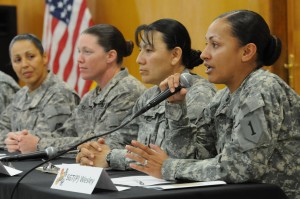Dr. Deborah Grady has been at the San Francisco VA Medical Center more than 20 years and is a recognized leader in women’s health research. In a recent interview, Grady said when she started working at the VA most of the female patients were World War II veterans whose problems were primarily those of aging. Today the largest group of female veterans in the country served in Iraq or Afghanistan. “There’s been a large influx of younger women,” she explains, as women’s role in the military has broadened and the conflicts themselves have changed.
Nationally, women patients are more likely than their male counterparts to have a service-connected disability. The most common ailment among the younger women -- one which they suffer more often than men -- is musculoskeletal problems. Both healthcare providers and veterans’ advocates like Starlyn Lara of Swords to Plowshares suggest one possible reason: boots and body armor are not designed for female bodies. When women are required to serve in ill-fitting gear, injury may result.
Women are also coming home with sleep disorders, digestive issues and gynecological problems. Their frequent urinary-tract infections may be linked directly to active duty -- women may delay urination because they don’t want to stop convoys, feel unsafe at night, or are located in isolated areas.
A recent government report showed that management of high blood pressure, high cholesterol, and diabetes is worse for women veterans nationally. There are also documented disparities [PDF] between men and women in preventive care: fewer women veterans received colorectal cancer screening, depression screening, and immunizations (pneumococcal and influenza).
“I think the VA has been responsive to this,” Grady said. Women veterans receive Pap smears and mammograms with the same regularity as the rest of the population. There are programs for smoking cessation and diabetes education -- and if women request a group without men, she said, the VA is usually able to accommodate that.
However, she agreed that the culture overall presents challenges. As a woman “you’re a minority there,” Grady says. “The way we’ve tried to address that is we have a separate clinic. We have a place called ‘The Women’s Center’ where almost all of the women veterans receive their care.”
Having a separate place for women to get care serves two objectives. The veterans are more comfortable, and the doctors are more specialized -- because they treat only women. The San Francisco clinic was established with federal funds in the early 1990s, she said, and almost all of the providers who seek work there are women.
In response to its survey findings, the State Commission on the Status of Women has called for California’s women veterans to get “access to high quality, gender-specific healthcare; separate spaces to receive care and treatment and staff that are trained to understand and meet their needs.” In addition to San Francisco, women can receive gynecologic and gender-sensitive primary care in Palo Alto, Fresno, San Diego, Los Angeles and Long Beach.
Eve Harris is a Bay Area writer. Check out her health blog, A Healthy Piece of My Mind.
